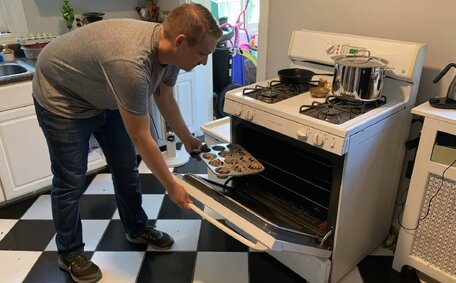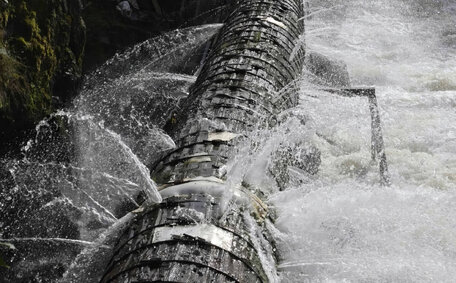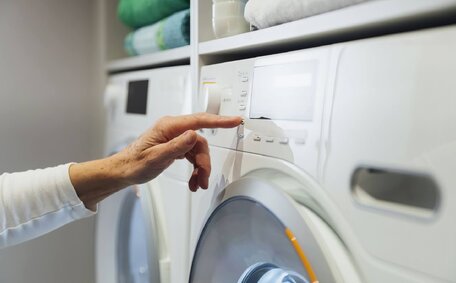Understanding How a Gas Valve Works
Addressing malfunctions with your furnace gas valve is essential for efficient heating and cooling system performance. The primary role of a gas valve is to control the gas supply, maintaining the proper gas flow to the heating system. A well-regulated gas valve minimises risks, ensuring secure and efficient operation that provides warmth, particularly in the colder months.
When the thermostat signals for heat, the gas valve opens to allow warm air and hot water into the furnace. Meeting the ideal temperature showcases the gas valve at peak operation, as it opens and closes precisely to control fuel flow, maintaining the efficiency of the heating system and preventing gas valve problems. This precise mechanism can direct the flow gas into your gas furnace effectively, leading to a reduction in wasted energy and mitigating potential hazards.
A faulty gas valve impairing accurate gas flow is a significant concern. For any faulty furnace gas valve issues, seek the assistance of a specialist and contact HVAC professionals promptly.
Ignition failures and frequent pilot light outages signal that the gas valve may be defective; other indicators include odd smells and continuous power cycling.
Gas Leak
One of the gravest risks emerges when furnaces gas valve malfunctions in heating systems can cause gas leak, hazardous for both the furnace and air conditioning units.
Natural gas has a distinctive 'rotten egg’ smell added to help detect leaks quickly, ensuring timely repairs. If you catch a whiff of this smell anywhere in your home, especially near heating equipment, evacuate everyone immediately and call professional emergency services due to a potential faulty gas valve your furnace might have.
Avoid activating any electrical switches or devices that could ignite a gas explosion.
Inform your neighbours and await emergency services to resolve any heating and cooling system issues.
Furnace Ignition Lockout
Furnace gas valve issues and subsequent lockouts in modern heaters and boilers often necessitate professional servicing. A furnace ignition lockout often indicates valve problems. It’s recommended to call HVAC technicians for issues, including abnormal gas flow or compromised wiring.
A lockout indicates a gas valve failure, often accompanied by an inducer motor lockout, leading to questions about furnace safety. This safety feature, involving the inducer motor, helps prevent hazards such as gas leaks. In this situation, Your boiler might trigger a safety mechanism and locks out, requiring a reset to start up again to prevent repeated failed ignition attempts that can lead to furnace malfunctions.
A lockout, frequently indicating a malfunctioning gas valve, happens when the unit cannot suitably modulate gas, often due to control board errors as denoted by blinking LED signals. Common reasons for furnace lockouts include issues that could affect your furnace:
- Issues with the thermostat or pressure switch that may indicate how know your furnace gas valve is malfunctioning
- Defective or dirty flame sensor
- Faulty gas valve coils and solenoids
- Broken or clogged gas line pipes and vents
- Worn out components or a compromised printed circuit board
- Damaged printed circuit boards and malfunctioning control relays
Consider a circuit board malfunction when dealing with ignition issues or gas valve failures. Engaging an HVAC technician to repair faulty elements such as a gas valve is essential for the proper functioning and safety of your heating system.
Given that gas valves are meant to regulate fuel distribution, issues such as coil burnout or jammed elements can disrupt the ignition sequence, suggesting it might be time to replace gas valve components to prevent a system lockout.
Lack of Heat or Irregular Cycling
If a faulty gas valve results in inadequate heat despite an active furnace, the valve may be the root issue. This is because when the gas valve one faulty component, it struggles to regulate the gas flow properly into the heating unit.
Low heat output may occur if the valve allows insufficient gas into the furnace, or a fault may cause it to stick, leading to irregular cycling on and off.
Some of the common signs of this issue include:
- Lower than usual indoor temperatures
- Longer times to reach the thermostat set temperature
- Frequent calls for heat with short runs times
- The burner turning on and off multiple times per hour
- Intermittent heat delivery or sudden bursts of heat
Troubleshooting furnace gas problems associated with a faulty gas valve can identify issues with ignition controls like flame sensors and ignitor coils. To know furnace gas valve functionality, they demand precise operation for proper furnace cycling. The replacement of a faulty valve, critical for keeping signs bad gas valve from impacting your system, by a professional HVAC contractor, ensures efficient and reliable heating.
Troubleshooting a Faulty Gas Valve
Checking the Gas Supply
Initially, addressing any gas supply line issues is crucial to ensure the furnace functions properly.
- Enlist the expertise of home services proficient in troubleshooting furnace issues, where a closed or clogged valve may lead to gas flow obstructions.
- Inspect the supply line and connectors for any visible cracks or damage that could be causing leaks.
- Contact your gas utility company if there are any issues to ascertain how to know about the gas supply pressure to the property.
Inspecting the Gas Valve Itself
Carefully examine your furnace’s gas valve for components that could also cause it to malfunction:
- Loose wiring connections at the valve electromagnets and coil terminals
- Corrosion or heat damage on the valve components
- Debris stuck in the valve preventing proper motion
- Leaking seals or gaskets
Using an ohmmeter, test for faulty gas valve electrical resistance to gauge operation and identify issues. Should the readings fall out of the expected range, it implies the gas valve working outside its intended operational specs.
Testing Related Components
You can get a signal from faulty secondary controls indicating your furnace gas valve might have operational issues. Test items like:
- Thermostat wiring and settings
- Flame sensor condition
- Furnace control circuit boards
- Pilot assemblies and orifices
If uncertainty lingers over the precise issue, it’s best to engage a licensed HVAC company for a comprehensive diagnosis to ensure proper operation, especially if the gas valve in your furnace appears defective.
When to Call a Professional
Faulty gas valves can create dangerous situations and impede home heating, making it crucial to involve a licensed professional promptly to prevent further system damage. Don’t take risks; ensure that your service provider is gas safe registered before you attempt any repairs on gas appliances.
Erskine Park Plumbing’s certified gas technicians provide 24/7 emergency services and boiler repairs. We advise scheduling an inspection if you notice at least three signs from the following list:
- A gas smell coming from the furnace
- Visible damage or abnormalities on the valve itself
- Pilot lights that frequently blow out
- Furnace ignition lockouts and error codes
- Irregular cycling or intermittent heat
- Unusually high energy bills
Our gas safe accredited experts can diagnose and swiftly fix your gas valve issues, ensuring your heating system runs smoothly. We also offer maintenance plans and can optimise your heating system to maximum efficiency.
For immediate assistance with your heating system, contact Erskine Park’s top-rated plumbers at 1300 349 338 or email [email protected].
Safety Precautions
Safety is the foremost priority when handling gas valve issues. Questioning 'How do I repair my gas appliances?’ is common, but unprofessional tampering can lead to hazardous situations, so it’s critical to take precautions.
If you smell gas or suspect a leak, evacuate immediately and contact emergency services. If something goes wrong that could damage your gas system, many homes have emergency gas shutoff valves, typically located near gas metres. Know the location of this valve and how to turn off the gas supply if required.
It’s also crucial to install carbon monoxide detectors on every level of homes with gas appliances. Carbon monoxide is an odourless, poisonous gas that must be handled as soon as possible as it can leak from faulty equipment and endanger inhabitants.
Do not ignore unusual smells or sounds from furnaces and boilers, and contact HVAC experts if needed. Prioritising regular furnace maintenance and professional inspections from a licenced technician is crucial. With a skilled boiler engineer, you are guaranteed accurate diagnosis and safe repair execution.
Trying impromptu repairs or meddling with gas valves could aggravate the issue, so it’s best to call in HVAC experts. Always call certified specialists like those at Erskine Park Plumbing when assistance is needed. We make safety our top concern during every service call.
Preventative Maintenance
Routine preventive maintenance by an experienced technician keeps your furnace’s gas system in prime condition, ensuring efficient operation and extended lifespan of components like the valve. Annual boiler service checks can catch small problems before they escalate into serious safety concerns or cause complete breakdowns.
During maintenance appointments, our certified plumbers meticulously check for faulty gas valve signs and examine all other components. We check for corrosion, debris buildup, leaking gaskets, or electrical issues that can compromise valve function over time. Maintenance gives us a chance to clean or replace parts before they fail.
Upkeep appointments also ensure proper gas pressure and flow settings for optimal performance. Keeping your appliance tuned up saves on energy bills and reduces the risk of emergency repair costs from equipment failure.
Protect your investment and family by scheduling preventative maintenance from Erskine Park’s most trusted plumbing company. Our techs keep safety the priority while optimising and extending the lifespan of your heating system.
Recognizing Symptoms of a Faulty Gas Valve
There are several key symptoms that can indicate signs your furnace gas valve is failing and needs replacement. Being aware of these signs allows you to address issues promptly before they become dangerous.
Strange Noises From the Furnace
Strange noises from your furnace, particularly around the gas valve, serve as a warning sign. This includes hissing, humming, or loud clicking when the system turns on or off. These noises likely indicate worn out valve components that can no longer regulate gas flow properly.
Lack of Adequate Heat
If your home is taking longer to get warm despite the furnace running continuously, it could point to a situation where the faulty valve opens insufficiently, restricting gas flow. Poor heat output usually means the valve is stuck partially closed and unable to open sufficiently.
Irregular Cycling On and Off
Frequent short cycling of the furnace, with the burner turning on and off multiple times per hour, suggests problems with gas flow regulations that might necessitate to replace your gas valve. This unstable operation can cause furnace inefficiencies, making the unit work harder without maintaining the right temperature. Replacing the deteriorated gas valve will restore proper on/off functionality.
Keep in mind that one of the most common components to wear out, the gas valve, typically lasts 10-15 years. If your valve is outdated, being attentive to these common symptoms can prevent more extensive breakdowns. Contact a professional immediately if you suspect valve failure.






